|
|
|
Sort Order |
|
|
|
Items / Page
|
|
|
|
|
|
|
| Srl | Item |
| 1 |
ID:
053800
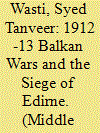

|
|
|
| 2 |
ID:
095018
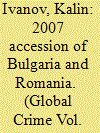

|
|
|
|
|
| Publication |
2010.
|
| Summary/Abstract |
For both objective and subjective reasons, the European Union devoted unprecedented attention to the problem of corruption in Bulgaria and Romania. The European Union (EU) faced a complex challenge in wielding its arsenal of carrots and sticks to encourage reform in the two countries. Conditionality was further complicated by rivalries between Sofia and Bucharest. Despite its limits, EU pressure presented a rare opportunity to depoliticise anti-corruption policy. After accession, Romania regressed from its previous achievements against corruption, and Bulgaria remained reluctant to prosecute senior officials or confront organised crime. Nevertheless, the European Commission continued its monitoring activities, and its ability to freeze funds maintained a modicum of pressure for reform. More effective anti-corruption efforts are possible if a domestic constituency for reform gains sufficient momentum to replace the EU's waning influence.
|
|
|
|
|
|
|
|
|
|
|
|
|
|
|
|
| 3 |
ID:
157268
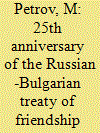

|
|
|
|
|
| Summary/Abstract |
RUSSIA AND BULGARIA have a very extensive history of relations that goes back ages and that has ensured the mutual spiritual enrichment of our nations. For instance, in the 10th-13th centuries, Bulgaria made a significant contribution to fostering Christian culture in Rus [Old Russia] and in the 19th century, the Russian empire played a decisive role in the formation of the sovereign Bulgarian state. Our bilateral ties were not devoid of painful downturns and setbacks as evidenced, in particular, by the breaking of diplomatic relations in 1886, 1915 and 1944. Every time, however, Russia and Bulgaria found ways of restoring the level of cooperation that had been achieved and sometimes even surpassing it.
|
|
|
|
|
|
|
|
|
|
|
|
|
|
|
|
| 4 |
ID:
082259
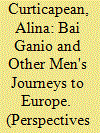

|
|
|
|
|
| Publication |
2008.
|
| Summary/Abstract |
This article examines the role of Balkanism in Bulgarian EU accession discourses
during the period that preceded the country's membership of the EU. It focuses on political
cartoons ? regarded as indicative of broader societal discourses ? which activate the 'journey'
or 'motion' metaphor that dominated the imagery of EU integration. The article was
prompted by a perceived incongruity in the study of the discursive encounter between the
West and the Balkans. While most analysis concentrates on the Western or European self, by
examining EU accession discourses in Bulgaria, this article turns to the Balkans' responses to
Western constructions. The study brings to light a decidedly mixed picture. Even though the
crucial role of Balkanist representations and interpretations in Bulgarian EU accession
discourses cannot be denied, alternative constructions are certainly present. They range
from ambiguity and indifference to more overt challenges to the binary oppositions that
characterize Balkanism.
|
|
|
|
|
|
|
|
|
|
|
|
|
|
|
|
| 5 |
ID:
139278
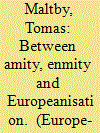

|
|
|
|
|
| Summary/Abstract |
Considering the development of the Bulgarian energy security strategy this article analyses how the country has adapted to EU membership and to energy security challenges, such as disruptions to Russian gas supplies in 2006 and 2009 and rising gas prices. Utilising a conceptual lens which synthesises Regional Security Complex Theory and Europeanisation, the article offers an explanation of energy policy changes. It concludes that conceptions of Russia as an energy security guarantor have changed since Bulgaria's EU accession and that Bulgarian energy policy has undergone a qualified reorientation away from a positive dependence on Russian energy sources, towards a convergence with EU priorities of diversification and a single energy market.
|
|
|
|
|
|
|
|
|
|
|
|
|
|
|
|
| 6 |
ID:
013935
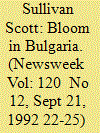

|
|
|
|
|
| Publication |
Sept 21, 1992.
|
| Description |
22-25
|
|
|
|
|
|
|
|
|
|
|
|
|
|
|
|
| 7 |
ID:
091715
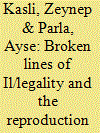

|
|
|
|
|
| Publication |
2009.
|
| Summary/Abstract |
After the granting of citizenship to 300,000 immigrants from Bulgaria in 1989, Turkey has enacted visa regime changes concerning more recent migrants from Bulgaria, who, according to the most recent modification, are only allowed to stay for 90 days within any six-month period. In this article, the authors demonstrate that the broken lines of legality/illegality produced by these changing policies further entrench the sovereignty of the state through the "inclusive exclusion" of immigrants who are subject to the law but not subject in the law. The temporary legalization of Bulgarian immigrants to Turkey in return for voting in the Bulgarian elections reveals that the state extends its transnational political power by drawing and redrawing the broken lines of legality/illegality. We demonstrate not only the ways in which the migrant population from Bulgaria is managed but also the strategies deployed by the migrants themselves in the face of such sovereign acts.
|
|
|
|
|
|
|
|
|
|
|
|
|
|
|
|
| 8 |
ID:
091743
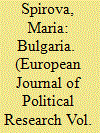

|
|
|
| 9 |
|
| 10 |
|
| 11 |
ID:
083385


|
|
|
|
|
| Publication |
2008.
|
| Summary/Abstract |
In 2001-2004 Bulgaria and Romania led internationally sponsored small arms and ammunition destruction. A few years later, they all but disappeared from destruction discussions. How to explain the enigma of these two countries' initial and large-scale action and their later hesitation? Both cases reveal the importance of external actors in small arms disarmament, in this case, especially the United States. It was Washington that created the initial demand for weapons destruction, as well as later export demands through war in Afghanistan and Iraq. While host authorities in Bulgaria and Romania may want to destroy at least part of their surplus stocks, they seem unwilling to make significant investments of their own. Convincing them to take ownership of the problem and solutions must be the next major objective of donor countries. The two countries are far from identical. Bulgaria has been more transparent, making informative reports on small arms policy to the United Nations and aiding foreign research into its small arms situation. It has shown somewhat greater interest in the disposal of surplus stocks, designating weapons for future destruction. Romania has been considerably more secretive; only limited information has been made available and the future of its weapons policies is much more obscure. But Romania has created a more reliable basis for future surplus destruction by reducing its armed forces more dramatically, especially its reserve rolls. Bulgaria seems more likely to resume destruction of surpluses, but Romania is likely to eliminate more when it gets around to it.
|
|
|
|
|
|
|
|
|
|
|
|
|
|
|
|
| 12 |
ID:
129210
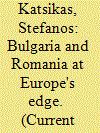

|
|
|
|
|
| Publication |
2014.
|
| Summary/Abstract |
Bulgaria and Romania joined the European Union as full member states on January 1, 2007. This momentous event was the culmination of a long and demanding political project that has often been described as "Europeanization." Although the foundations of this project were laid fairly soon after the fall of both countries' communist regimes in 1989, the pace was slow, and did not really gain momentum
until the end of the 1990s. Over the years the project ebbed and flowed, but what kept both nations committed was their strong belief that joining the EU would fill the political, economic, and security vacuum that the dissolution of the communist bloc had produced. EU membership was popularly seen as a panacea that would allow Bulgaria and Romania to stabilize their newborn democratic systems and overcome the economic problems of the postcommunist transition. It offered confirmation that the Bulgarians and Romanians were really Europeans. Seven years later, however, rather than feeling pulled into the heart of Europe, Bulgaria and Romania find themselves at the edge. Their EU partners raise questions about their commitment to the rule of law and their willingness to crack down on organized crime and illegal immigration. Does this mean that membership has not been an easy route to democratic stability, economic growth, and greater opportunity for all? European integration may be a difficult topic at a time when economic crisis has, for some, cast the entire effort into doubt. But the situation of Romania and Bulgaria lends itself to reflection on the wider project and its overall historical importance.
|
|
|
|
|
|
|
|
|
|
|
|
|
|
|
|
| 13 |
ID:
087200
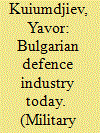

|
|
|
|
|
| Publication |
2009.
|
| Summary/Abstract |
This year the Bulgarian defence industry will celebrate its 130 anniversary. During that period the industry has strengthened and developed, keeping in track with the leading world defence industries and implementing advanced scientific and technological achivements in this sphere.
|
|
|
|
|
|
|
|
|
|
|
|
|
|
|
|
| 14 |
ID:
137349
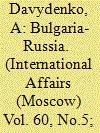

|
|
|
|
|
| Summary/Abstract |
The conference was sponsored by Bulgaria's nongovernmental organizations: the Slavyane Foundation, the Bulgaria-Russia Foundation, the Bulgaria-Russia Forum, and the Federation of Friendship with Peoples of Russia and the CIS. Assistance in organizing the conference was provided by the Diplomatic Institute of the Ministry of Foreign Affairs of the Republic of Bulgaria, the National Association of International Relations, the Bulgarian Diplomatic Society, and the Bulgarian Academy of Sciences.
|
|
|
|
|
|
|
|
|
|
|
|
|
|
|
|
| 15 |
ID:
106219
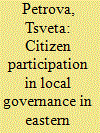

|
|
|
|
|
| Publication |
2011.
|
| Summary/Abstract |
This article studies the impact of citizen participation on local government performance in Bulgaria. Both survey and interview data are used to suggest that, all else being equal, municipal efficacy grows with the increasing involvement of social and economic actors in the policy-making process. This improved government efficacy is most likely a result of the professionalisation and organisational strength of the third sector. Although the politicisation of the local state has undermined its capacity, municipalities have been able not only to reconstitute some of their authority but also to improve the output and the quality of their policy making by employing the expertise and support of major local civic organisations.
|
|
|
|
|
|
|
|
|
|
|
|
|
|
|
|
| 16 |
ID:
114952
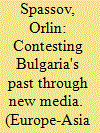

|
|
|
|
|
| Publication |
2012.
|
| Summary/Abstract |
This essay investigates the conflict between two different ways of writing in Bulgarian on the web: using the standard Cyrillic alphabet and using the Latin script. Initially, the reason for using the Latin script was purely technical: the absence of appropriate software for decoding Cyrillic fonts. However, the Latin script remained popular even after the encoding problems were solved, acquiring new ideological meanings and provoking political controversies. This essay discusses the subcultural, cultural and political consequences of these developments.
|
|
|
|
|
|
|
|
|
|
|
|
|
|
|
|
| 17 |
ID:
119614
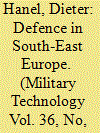

|
|
|
|
|
| Publication |
2012.
|
| Summary/Abstract |
After the collapes of Soviet Union in 1991, the disintegration of Yugoslavia in 2002, and EU and NATO enlargement, South-East Europe became a region characterised by fundamental political, economic and military change.
|
|
|
|
|
|
|
|
|
|
|
|
|
|
|
|
| 18 |
ID:
132849
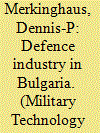

|
|
|
|
|
| Publication |
2014.
|
| Summary/Abstract |
Bulgaria is a NATO member country with a large indigenous defence industry. Most of its weaponry is of soviet design, but with significantly improve performance.
|
|
|
|
|
|
|
|
|
|
|
|
|
|
|
|
| 19 |
ID:
073659
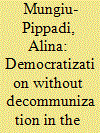

|
|
|
|
|
| Publication |
2006.
|
| Summary/Abstract |
Since recent U.S.-led democratization projects having led in some cases to the election of Islamist movements, the old democratic theory that structural preconditions are key determinants of successful democratization has apparently been bolstered. This article examines the democratization experience in postcommunist Europe to assess which matters more, a society's "givens" favoring democracy or the institutional imports that a democracy-minded elite can borrow. In particular, it compares the experience of the Southeast Europe countries, which presented poor prerequisites for successful democratization and yet in at least two cases (Romania and Bulgaria) are far along on the path to democratization to the experience of Central Europe and the former Soviet Union as a whole.
|
|
|
|
|
|
|
|
|
|
|
|
|
|
|
|
| 20 |
ID:
085568
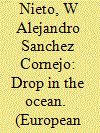

|
|
|
|
|
| Publication |
2008.
|
| Summary/Abstract |
This article discusses Bulgaria's NATO membership; the discussion centers on how Black Sea geopolitics have been altered due to NATO's increasing presence in the area. Furthermore, I discuss in what ways Bulgaria contributes to the NATO alliance by being a member. Finally, the article discusses the effects of the summer 2008 events in Georgia vis-a-vis Black Sea geopolitics. The geographical position and the events occurring around this Southeastern European country have made Bulgaria a strategically important country for the security future of the region
|
|
|
|
|
|
|
|
|
|
|
|
|
|
|
|
|
|
|
|
|